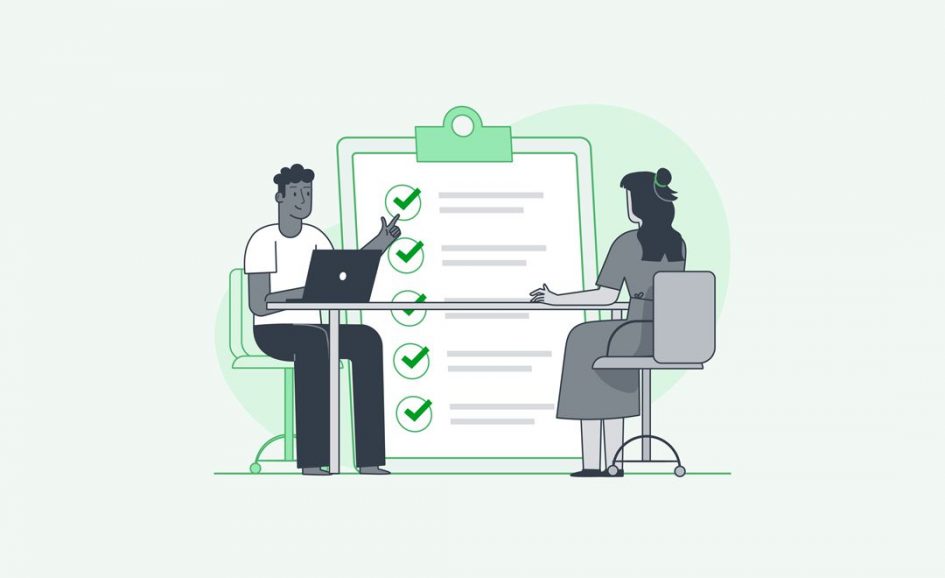Introduction of Technical Interviews!
Landing the right technical candidate can make or break your team’s success. However, with the ever-evolving landscape of technology, conducting effective technical interviews can feel daunting. But the question arises, how to conduct a technical interview?
Worry not!
This guide will provide you with the information and techniques to help you prepare and navigate through technical job interviews with confidence, ensuring you identify the most skilled and qualified individuals for your tech roles.
Types of Technical Interview Questions: Coding, Algorithms, and Systems Design
Coding Interviews:
Evaluate candidates’ programming skills by asking them to solve coding challenges, usually within a limited time frame.
System Design Interviews:
It examines how well candidates can create scalable and efficient systems, emphasizing their grasp of system structure, database design, and the system’s capacity to handle increased demands.
Algorithmic Problem-Solving Interviews:
It usually measures candidates’ analytical thinking and problem-solving skills through algorithmic challenges to assess their ability to devise efficient solutions for complex problems.
Preparing for a Technical Interview: A Step-by-Step Guide
Researching the candidate and their background:
Before the interview, research the candidate, and dive into their resume and LinkedIn to tailor questions and make the conversation more meaningful. Consider it a pre-game check to level up your interview!
Crafting job-specific questions and scenarios:
Crafting job-specific questions and scenarios involves formulating interview inquiries directly relevant to the role. This approach guarantees that the questions evaluate the candidate’s suitability based on the job’s specific requirements, such as creating coding-related queries for a developer position. Tailoring the interview to concentrate on skills related to the job enables an informed hiring decision.
Setting up the interview environment (in-person, phone, or video)
In-person interview:
Choosing a quiet and professional setting is essential when preparing for a technical interview. You should also have any necessary technical equipment, such as a whiteboard, markers, and audio-visual equipment, ready for use. It is crucial to confirm the interview location with the candidate and arrange for them to access the interview room easily.
Phone Interview:
Before the phone interview, you must ensure your lines are clear and free from any disturbances. If you’re using conference calls, ensure all the necessary arrangements are in place to prevent interruptions.
Video Interview:
Choosing a reliable platform such as Zoom or Google Meet is crucial when conducting a video interview. Before the interview, double-check that your video and audio are functioning properly. It’s also necessary to anticipate any technical difficulties and have backup contacts as a precautionary measure.
Common Technical Interview Mistakes: How to Avoid Them
Both interviewers and candidates need to avoid common mistakes during technical interviews.
Candidates:
Lack of preparation: Not researching the company or role, leading to irrelevant questions or insufficient knowledge.
Poor communication: Not clarifying the role (ask relevant questions!), unclear explanations, and skipping important steps.
Interviewers:
Lack of feedback: Failing to provide constructive feedback, unbalanced difficulty (too hard or too easy), or lack of candidate support.
Unclear expectations: Not clearly understanding the role or desired skills.
Technology Trends in Technical Interviews
Mode of Interview:
Virtual interviews are one of the most commonly used kinds of interviews today. Virtual technical interviews are essentially like regular technical interviews, conducted online instead of in person. You’ll still be expected to demonstrate your technical skills and knowledge through platforms like video conferencing and online coding tools. The interviewee can use Platforms like HackerRank or Codility to write and run code in a shared environment.
Automated Coding Assessments:
Automated coding assessments are essentially computerized tests that evaluate a candidate’s coding skills and abilities. They typically involve candidates solving coding problems within a specific platform or environment. These problems may involve implementing specific functionalities, algorithms, or data structures. The platform automatically assesses the submitted code based on various criteria, such as Functionality, Efficiency, and Code quality.
Post-Interview Assessment and Decision-Making
After the interview, there’s a step called “post-interview assessment and decision-making.” This means that the person who interviewed you will think about how well you did in both technical (related to the job skills) and non-technical (like communication and teamwork) aspects. They use this information to decide whether you fit the job well. It’s like evaluating all the information from the interview to decide if you’re the right person for the position.
Conclusion
A technical interview requires thoughtful planning, clear communication, and a comprehensive technical and soft skills understanding. This guide provides essential insights into key aspects of this process, such as preparing for the interview, types of questions to ask, and post-interview review. By following these tips, interviewers can create a positive experience for candidates and make informed decisions about their skills and suitability for the job.

Leave a Reply